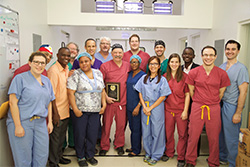Amazing Stories: Medical Mission to Haiti

A Team of orthopedic surgeons at NewYork-Presbyterian/Columbia University Irving Medical Center are helping to improve musculoskeletal care in Haiti.
Long before the 7.0 magnitude earthquake hit Haiti in January 2010, the small island nation struggled to adequately provide healthcare. The most impoverished country in the Western Hemisphere, almost half of the population had no access to health services, according to the World Health Organization. The quake shredded what was left of the tattered healthcare system — hospitals building collapsed, and already strained non-governmental organizations (NGO) worked to care for the injured.
But tragedy gave rise to new hope, as the international medical community rallied to provide emergency care. In the years since the earthquake, one team of orthopedic surgeons at NewYork-Presbyterian/Columbia University Irving Medical Center continue to help as the Haitian medical community attempts to rebound and grow.
“We felt a great desire to help. About two weeks after the earthquake, we made a trip to Santo Domingo, in the Dominican Republic, which shares the island with Haiti. We set up an initial base of operations there because they didn’t have sterile hospital facilities in Haiti to do surgeries,” says Dr. Melvin Rosenwasser , the director of the Trauma Training Center and the Hand, Elbow & Microvascular Fellowship at NewYork-Presbyterian/Columbia University Irving Medical Center. “At the end of the trip, we went to Haiti with supplies and set up a base of operations that we’ve been going to every year since.”
With support from NewYork-Presbyterian, Columbia University Irving Medical Center, and the Foundation for Orthopaedic Trauma — a professional organization dedicated to orthopedic education and research, Dr. Rosenwasser takes a team of physicians and nurses on a weeklong medical mission to the Hôpital Adventiste d’Haiti in Port-au-Prince, just 16 miles from the epicenter of the earthquake. This year, the team — three orthopedic surgeons, three orthopedic residents, one hand surgery fellow, two scrub nurses, and a research assistant — set out to provide care for congenital cases and injuries.
“The types of injuries we treat change from year to year, although we still see a few patients that were earthquake victims with deformities that needed correction. So even after eight years, there are patients out there with untreated or partially treated injuries,” Dr. Rosenwasser says. “On this last trip, we did 44 operations in one week. We saw trauma injuries — vehicular accidents, various birth injuries, cerebral palsy, vitamin and nutritional deficiency, and infections that are rampant that can change the way the skeleton grows in children and adults. And things you’d see here in the US like degenerative diseases.”
He adds: “Many of these conditions are quite advanced because of lack of expertise or training. So when we get there, we are dealing with things you wouldn’t routinely see in the United States because they are caught and treated earlier. Each time we go to Haiti, we’re also training their medical students and residents.”
Dr. Rosenwasser says, although there are many Haitian orthopedic surgeons in the United States and other countries, few remain on the island. Haiti has a physician shortage for all medical specialties, especially orthopedic surgery. A 2002 survey by the Surgeons d’Haiti Orthopedic and Trauma found there were 67 practicing orthopedic surgeons in Haiti. In the years since the earthquake, that number has almost doubled to 127.
The orthopedic team at NewYork-Presbyterian/Columbia is just one group of many medical organizations from around the world going to Haiti and other medically deprived countries to provide care throughout the year. In addition to orthopedic missions, NewYork-Presbyterian, and its academic partners Columbia University Irving Medical Center and Weill Cornell Medicine, help sponsor tropical disease missions to Brazil, diabetic care missions in Ghana, and HIV/AIDS treatment missions in India. Each mission coordinates with a local hospital or medical clinic to gather patients in need of specialized care.
“Each day, there was a mass of humanity that gathered. There was always more patients than we could take care of. But those cases are passed on to the next team. Hopefully, they have the expertise to provide care for those patients,” Dr. Rosenwasser says.


